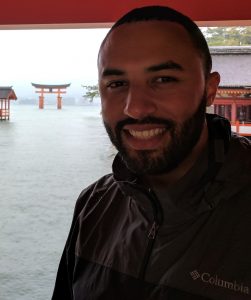The Rome Foundation and Drossman Gastroenterology welcomed Dr. Hannibal Person from the Icahn School of Medicine at Mount Sinai Medical Center January 14-16, 2020
Drossman Gastroenterology and the UNC Center for Functional GI & Motility Disorders welcomed Rome Foundation Visiting Scholar, Hannibal Person, MD on January 14-16, 2020. He spent time in practice with Dr. Drossman and visited with Dr. Palsson and Dr. Whitehead to discuss current research.
 From Dr. Person:
From Dr. Person:
I am a second-year pediatric gastroenterology fellow at the Icahn School of Medicine at Mount Sinai. Throughout my training I have encountered many patients with functional gastrointestinal disorders, and I have always been drawn to these conditions, not only because of an interest in the brain-gut axis, but also the tremendous opportunity to provide meaningful interventions to reduce symptoms and improve quality of life.
I have long been aware of Dr. Drossman’s work, having read many of his papers and having attended the Rome Foundation Symposium on Functional GI Disorders last year. I am grateful for the opportunity to be able to rotate with him, including observing his clinical approach and discussing the management of FGIDs with him.
I particularly appreciated how the emphasis of this rotation was not only on enhancing my understanding of the pathogenesis and management of FGIDs, but also fostering strong communication skills to engage and collaborate with patients with these conditions. Hearing from Dr. Drossman’s patients and understanding their frequent experience of feeling invalidated and unsupported by their previous providers will shape my own practice, as I seek to become a provider who is open and collaborative.
Further, observing his bedside manner which focuses on engaging with the patient, validating their symptoms and concerns, and providing them with a supportive space to discuss the many complicated aspects of their symptoms and how they impact their functionality, will inform my own approach.
Finally, having access to Dr. Drossman to discuss his innovative work surrounding the management of these conditions, including narcotic bowel syndrome, has provided me with comfort employing a host of new therapeutic modalities in managing my own patients.
Overall, I benefited tremendously from the opportunity to rotate with Dr. Drossman, not only in increasing my exposure to therapeutic options for FGIDs, but also in developing strong communication skills around these topics.
- What made you decide to go into the Visiting Scholar program?
I have always been very interested in disorders of the brain-gut axis and see many patients with functional gastrointestinal disorders in my training program. I wanted to participate in the Rome Foundation Visiting Scholar Program in order to further develop my ability to manage these disorders, particularly by using neuromodulators, understanding the biopsychosocial model, and enhancing my communication skills. - What were your goals and objectives in attending the program?
My goals were to develop proficiency in using Rome criteria in the diagnosis of functional gastrointestinal disorders, gain confidence in using peripheral and central neuromodulators in the management of FGID, and build communication skills, particularly surrounding partnering with patients about their condition and treatment and addressing opiate use disorders. - To what degree were these goals/objectives met? Please describe?
These goals were all met during participation in the program. Working with Dr. Drossman and his team allowed me to observe the evaluation and management of complex cases within his practice. I gained significant experience in evaluating symptoms and determining which diagnostic criteria were met per Rome. I saw numerous examples of Dr. Drossman collaborating with patients who were in different stages of understanding and acceptance of their condition, explaining the brain-gut axis and the role of neuromodulators in their care. I was able to see different communication styles and skills being implemented, as well as the importance of providing these patients with validation and support. Finally, I was able to see different treatment strategies, gaining more comfort with the use of different treatments, including neuromodulators, in functional GI disorders. - What were the most meaningful aspects of your experience?
Hearing the experiences of the patients was the most meaningful, as many described going through an odyssey of various diagnostic tests and interventions to address their symptoms, often feeling discouraged, frustrated, and dismissed by the medical system. Seeing how with appropriate treatment and the right support these patients could regain their quality of life was inspiring. These stories encouraged me to modify the way I practice ensuring my patient’s feel heard and validated. - Do you have any further recommendations for us so that we may improve the program?
Having a scholarly component of the program might not only engage the rotator, but encourage them to delve further into their interests within functional GI. For example, having a journal club over lunch or presenting a case at the monthly case conference. - How will you use this information in building your own program?
This experience and the information I have learned will help me in building my own program to ensure patients are given a non-judgmental and supportive space to discuss their symptoms and other important past and current psychosocial features of their illness. Further, my program will similarly advocate for a team-based approach for these patients, providing them with helpful resources to better understand their condition and integrative ways to address their symptoms and improve their functionality. Finally, I will use neuromodulators and other pharmacologic interventions address symptoms, engaging the patient in their important role in re-regulating the brain-gut axis.
